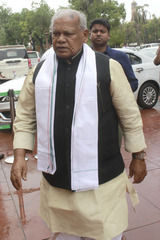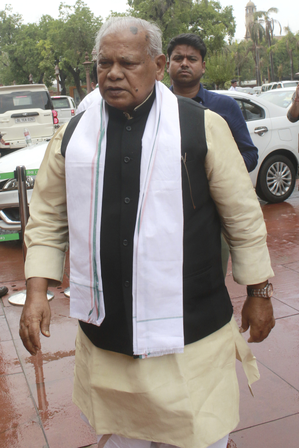

Patna, June 24 (IANS) The political temperature in Bihar continues to rise, with the ongoing controversy around ‘Damaad Rajniti (son-in-law politics)' in the state.
Union Minister and Hindustani Awam Morcha (HAM) chief Jitan Ram Manjhi added fuel to the fire on Tuesday by launching a sharp counterattack, indirectly targeting RJD leader Tejashwi Yadav.
Responding to Leader of the Opposition Tejashwi's criticism of Bihar government for allegedly forming a "Damaad Aayog (Commission of sons-in-law)", Manjhi took to social media to issue a biting retort.
Without naming anyone directly, Manjhi stated: “Joh apne parivaar ka nahi, who kisi ka nahi. (One who is not true to his family, cannot belong to anyone.)”
Union Minister Manjhi’s jibe was a veiled reference to the strained relations within the Lalu Prasad Yadav family — particularly the ongoing rift between Tejashwi Yadav and his elder brother Tej Pratap Yadav.
He hinted that Tejashwi, after sidelining his brother, may soon alienate his sisters and their husbands, potentially blocking any future political roles for them.
“The real reason behind this talk of ‘Damaad’ is a strategic move. So that when 'Gabbar Singh (Lalu Yadav)' wants to adjust his daughter or son-in-law in the future, this very statement can be cited to stop them,” Manjhi said in his post.
The spark behind this political clash is the recent appointment of Chirag Paswan’s brother-in-law Mrinal Paswan as Chairman of the Scheduled Castes and Scheduled Tribes Commission, and Manjhi’s own son-in-law Devendra Kumar in another key position.
Bihar’s Rural Work Minister Ashok Chaudhary’s son-in-law Sayan Kunal was also given a key post in a newly-formed commission by the Nitish Kumar government.
Tejashwi Yadav had accused the government of nepotism and fostering "damadvaad".
Manjhi, in his counter, reminded Tejashwi to “look at his own house first” before pointing fingers at others over political legacy and nepotism.
As Bihar moves closer to the 2025 Assembly elections, this war of words is rapidly turning personal, dragging family loyalties, political appointments, and dynastic traditions into the heart of electoral discourse.
What began as a debate over governance and commissions is now shaping up to be a full-blown clash of dynasties and ideologies.
--IANS
ajk/rad